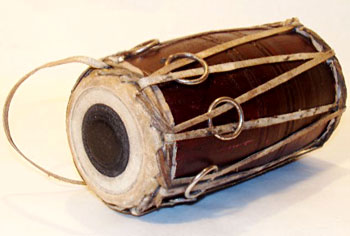 Madal is a particular type of hand drum found mostly in the tribal belt of Orissa, Bihar, Madhya Pradesh and eastern Uttar Pradesh. It is used particularly by the Oraons, Santhals and other related ethnic groups. The word often gets modified into Mardal and Mandar. What is of even greater significance is that it seems to have a parallel (in a slightly changed form in the Maddalam and the Maddale. Even in Orissa, the Pakhavaj is often called Mardal. Here again there is a mix-up of nomenclature, because the Madal is neither a bulging nor a cylindrical drum, though externally it appears to be one such.
Madal is a particular type of hand drum found mostly in the tribal belt of Orissa, Bihar, Madhya Pradesh and eastern Uttar Pradesh. It is used particularly by the Oraons, Santhals and other related ethnic groups. The word often gets modified into Mardal and Mandar. What is of even greater significance is that it seems to have a parallel (in a slightly changed form in the Maddalam and the Maddale. Even in Orissa, the Pakhavaj is often called Mardal. Here again there is a mix-up of nomenclature, because the Madal is neither a bulging nor a cylindrical drum, though externally it appears to be one such.
The shell of the Madal is of burnt clay and is waisted, though the construction at the centre is not as sharp as the Udukkai or the Damaru. It is much more gradual. Also the two mouths are of unequal sizes, the left being larger. The membranes are usually of monkey hide stretched across circular hoops or braids. The two hoops are interconnected by a leather strap, passing over and over again without touching the body. This gives the instrument the appearance of a truncated cone, especially as these leather strips almost hide the shell. The right face has a permanent load of iron filings and the left one of rice paste. To play the instrument, both the faces are beaten with the hands while holding the Madal horizontally.
This article is a stub. You can enrich by adding more information to it. Send your Write Up to content@indianetzone.com




















